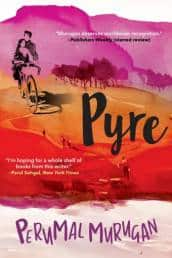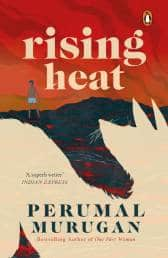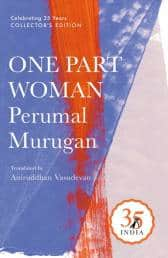



Born in Tiruchengode town in Tamil Nadu that is home to the famous temple for the half-woman god, Ardhanarishvara, Perumal Murugan began penning poems about rural life as a young college student. Hugely influenced by the poetry of Tamil politician-reformer Periyar, Murugan wrote his first novel, Yeruveyil in 1991 (published in English as Rising Heat in 2020). The novel dealt with how the society punished a couple who married outside caste.

His 2013 novel, Pookuzhi (Pyre), translated into English in 2016 by Aniruddhan Vasudevan, has been selected in the longlist of the International Booker Prize 2023 this week, follows a similar story, but to a chilling effect. The author, who took voluntary retirement from his full-time job as the principal of the Arignar Anna Government Arts College, Attur, in Namakkal, his native district, six months ago, rose to prominence a decade ago with his novel, Mathorubhagan (One Part Woman), about a temple ritual in Tamil Nadu performed by childless couples for conception. He faced a criminal case for hurting religious sentiments, forcing him to announce he was dead as a writer. He returned to writing with a new novel, Poonachi: Or the Story of a Black Goat (2016) after the Madras High Court dismissed the case. In this interview, translated from Tamil, Murugan talks about his works and what the honour of Pyre on the longlist of the International Booker Prize 2023 means to him and Tamil literature. Edited excerpts:
Pyre is the first Tamil novel to feature on the longlist of the International Booker Prize for this year. It is also the only Indian novel on the list. What does this honour mean for Tamil literature and you?
It is very important. Tamil is one of the six classical languages in the world and one of the two classical languages in India along with Sanskrit. In countries like Singapore and Malaysia, Tamil is an official language. It is spoken in several countries across the world, thanks to migration. In modern literature, Tamil occupies a high place. Pyre on the longlist of the International Booker Prize is a reflection of this. I have been a writer for the last 35 years. Since 2004, my novels have been translated into English. The last 10 years have seen most of my novels translated into English. My works have featured on the list of many important literary awards in the country. Featuring on the list of an international literary prize is a big honour for me. It is important for both Tamil literature and me.
'Couldn't you find a girl in our village, from within our caste? You have shamed us all,' this is the angry voice of a grandfather in Pyre. The novel is set in the 1980s, but this angry voice could be that in today's India, too.
There are differences today from those in the '80s. Communication and social media are better in villages today. If a problem like that in Pyre happens today, it will immediately come to the attention of the media and become a bigger issue. In the early 20th century, from my neighbourhood district of Karur in Tamil Nadu, many young people migrated to Malaysia and Singapore to work in the tea plantations. They went by sea and a lot of them were couples who had inter-caste marriage and were unable to live in their villages. We know about honour killings happening today because of the media. We didn't know about them earlier. But nothing much has changed in the mindset of the society. Inter-caste marriages are accepted by families only when they don't see any no other solution. Earlier families lived together in villages according to their castes, not with families from other castes. That hasn't changed much today.
The caste system plays a big part in your works. How did it influence you as a writer?
Writers observe life in society. In my college student life, I was drawn to Marxian philosophy, learning many things about class. Then I started reading (Tamil poet and reformer) Periyar. All his writings are about the ill-effects of the caste system. If BR Ambedkar wrote about the caste system in India, Periyar wrote about the situation in Tamil Nadu. I learnt a lot about caste from Periyar's writings. I wrote a collection of essays about the caste system, which was published in English as Black Coffee in a Coconut Shell: Caste As Lived Experience (Yoda Press) in 2017. Periyar was a big influence on me as a writer.

You have said earlier that the story of One Part Woman (2010) was inspired by stories you had heard about the temple ritual in Tamil Nadu surrounding conception. What was the point of departure for Pyre?
My first novel, Yeruveyil, which I wrote in 1991 (published in English as Rising Heat in 2020) dealt with how a couple who married outside caste were punished by society. After the year 2000, honour killings became a much-talked-about subject in Tamil Nadu as well as in the rest of the country. Then I thought I knew about a lot of stories of couples who were victims earlier and I should write about it. There are several layers of aspects about inter-caste love. In Pyre, the protagonists, Kumaresan is from a higher caste and Saroja is a Dalit. There are also instances when the girl is from a higher caste and the boy is from a lower caste. Couples within Dalit communities could be from different castes, too. There are many such aspects in inter-caste marriage that are created by our society. I wanted to focus on one aspect of this huge problem as I had their best story in my mind. I wrote Pyre in 2012, which was serialised in Kalki Tamil weekly. The situation in the Tamil society, which was talking about honour killings, was my inspiration.
You have done extensive research on Tamil literature as a student, a subject you taught as a college professor. Your PhD was on the life and works of Tamil author R Shanmugasundaram, who wrote 21 novels in Tamil, his first in 1942. Literary critics describe him as a trendsetter in the regional novel. Where do you see yourself in Indian literature after publishing 12 novels, 10 of which have been translated into English?
R Shanmugasundaram set his writings on the western part of Tamil Nadu. He wrote in the pre-independence era. The issues that he hadn't witnessed are important in my novels. It is important to note that he didn't explore issues of caste. He was a follower of Gandhian thought and focused on rural life. In my vision, caste is very important in my works. That, I feel, is special about my novels.
Your narrative on rural life is very powerful and adopts a style that is more intimate and personal than those of other contemporary writers in India today.
I started writing poems first as a young college student. I wrote poems on what I saw in villages like birds and trees. There were more rocks in our village than there were people. I remember more about goats and cattle than other things from early childhood. Nature and animal life were a huge inspiration in my poems. Therefore, there is a smell of poetry in my novels. In Tamil Nadu, people say I write poetry in my novels.

The protests against One Part Woman affected you severely forcing you to move to Chennai temporarily to attend court proceedings. You even quit writing for nearly two years. Is that all behind you now?
It is not an issue any more. There is no problem after the court judgement (in the author's favour). I wrote Poonachi and Estuary after the court case was over. I recently published a novel, Nethuneram. Caste is a major theme in that, too.
Most of your works are set in villages, except one, Estuary (Kazhimugam), in 2018, about the middle class and education, set in a small city.
Yes. After the protests against One Part Woman in 2015, I didn't write for one-and-half years. The first book I wrote after the protests was Poonachi. Then I wanted to write something different than the subject of caste. In the past two decades, I have been leading the life of a middle-class family man. I wanted to write about middle-class-family life and our education system that I understand very well as a college teacher and principal for many years. I have written several essays on the education system in the country. Last January, I published a collection of essays, titled, "Is Hair a Problem?". The new hairstyles of students these days are a huge problem for teachers. They can't accept these styles and harass the students. The essay collection was on these issues and the values of the education system. Kazhimugam, which was published in 2018, focused on the issues in the education system.
You paid tributes to your mother with a compilation of essays, Thondra Thunai (Invisible Companion), published in English in 2021 as Amma.
My mother passed away in 2012. My mother's name is Perumai and my father's, Perumal, which is my first name. My mother played a big role in my life and career. I wrote two essays about my mother in a Tamil weekly. Many readers responded. Tamil writer Ambai (CS Lakshmi) translated both essays into English. In 2017, I attended many literary festivals across the country and in panel discussions, I would wander into stories about my mother. My Tamil publisher Kalachuvadu Kannan, who would accompany me to these festivals, told me you mention a lot about your mother and suggested that I write a book about her. I didn't take it seriously initially, but Kannan persisted. I wrote 20 more essays about my mother, eventually publishing all 22 essays as Thondra Thunai.
What are you writing now?
I am writing a few essays for online magazines. I have plans for writing a few short stories and a couple of novels. I am also writing the dialogue for a feature film, an adaptation of Pyre. The agreement with the director was signed six months ago. The film's director, Tamizh, is writing the screenplay. Tamizh had directed a movie earlier based on my short story, Seththumaan (available on SonyLIV), about caste politics. I wrote the dialogue for Seththumaan (2022).
Discover the latest Business News, Sensex, and Nifty updates. Obtain Personal Finance insights, tax queries, and expert opinions on Moneycontrol or download the Moneycontrol App to stay updated!
Find the best of Al News in one place, specially curated for you every weekend.
Stay on top of the latest tech trends and biggest startup news.